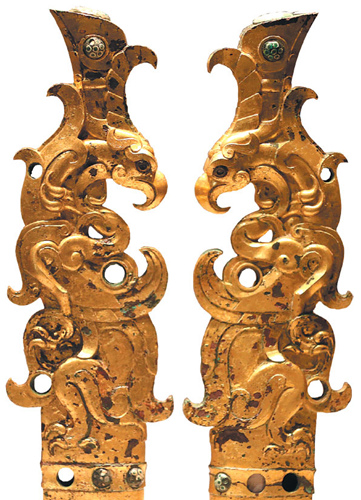 |
|
Gilt bronze finials in the shape of mythical beasts inlaid with glass. [Photo provided to China Daily] |
After toppling its adversary, a dynasty of 2,200 years ago paid due respect to the ways of its predecessor
Qin, whose first emperor united China for the first time, and Han, the dynasty believed to have laid the foundation for Chinese culture and civilization, had what today we might call a love-hate relationship.
Han (202 BC-AD 220) toppled Qin (221-206 BC), yet it adopted most of the rules and systems installed during its predecessor's time, in cultural, economic and political spheres. In many respects, Han was Qin's successor in the true sense of the word.
One telling example, says Tian Yaqi, of the Shaanxi Provincial Institute of Archaeology, involves Yongcheng, or the city of Yong, which served as capital of the kingdom of Qin between 677 BC and 383 BC, more than a century before the kingdom set itself on a course of constant expansion.
"On Qin's demise, the rulers of Han made Xi'an, by then known as Chang'an, 170 kilometers east of Yongcheng, the political center of their new regime," Tian says.
"Then, in a highly unusual gesture, they continued the Qin practice of using Yongcheng as the site of state-level worship, namely the offering of sacrifices to heaven.
"I say highly unusual because Chinese emperors believed their mandate came from heaven, calling themselves tianzi, the son of heaven. The fact that the early Han rulers, who still had the overthrow of the Qin fresh in mind, would cling to that same location to worship and solicit heaven's help is hard to believe."
Tian says the decision speaks a lot about the political wisdom and pragmatism of the Han rulers - their willingness to compromise if it meant a more speedy recovery of the war-torn society.
"Relocating the place of worship would have involved a huge amount of labor and cost. Judging by the evidence, the early rulers of Han did indeed learn a lesson from the demise of Qin."
|
|
|
|
|
|
|
|
